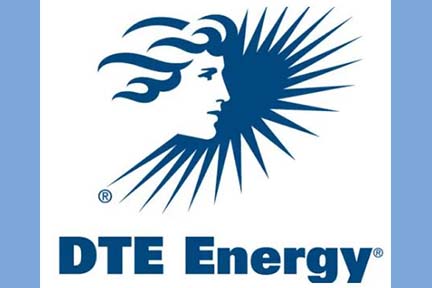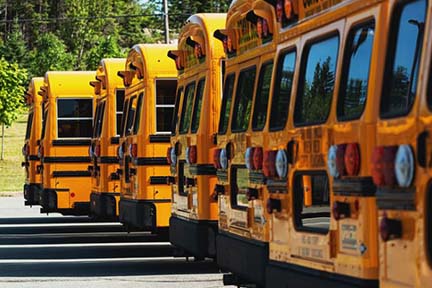FOR IMMEDIATE RELEASE
Jan. 10, 2024
Contact: Jeff Johnston, EGLE Public Information Officer, [email protected], 517-231-9304
Bipartisan Infrastructure Law to help Michigan school districts buy clean and electric school buses
Second year of $5 billion U.S. Environmental Protection Agency program supports purchase of more than 65 clean school buses, improving air quality and lowering costs for schools
Michigan’s transition to clean- and electric-energy school bus fleets has shifted into a higher gear with the announcement of millions coming to the state from President Biden’s Bipartisan Infrastructure Law’s Clean School Bus Program (CSBP) grants.
Detroit, Lansing, and Pontiac public school systems will each receive $5,925,000 in federal funding to buy 15 clean-powered school buses apiece.
Funding through third-party multistate grantees First Student Inc. and Highland CSB 1 will help purchase electric buses in five additional Michigan public school systems: 10 buses in Flint; five in Redford Union No. 1 near Detroit; and two each in Mason County, Brimley, and the West Shore Educational Service District in Ludington.
“These EPA Clean School Bus Program grants will help Michigan schools buy and use new, clean school buses to take kids to school safely, protect clean air in and around our schools, and power the future of our mobility industry,” said Governor Gretchen Whitmer. “Thanks to these federal investments in buses that cost far less to fuel and maintain, Michigan schools can redirect some of their transportation budgets back into the classroom to buy new textbooks, support educators, and reduce class sizes. Together, we are taking action to meet the goals of the MI Healthy Climate Plan and the historic clean energy package I signed late last year to lower household utility costs, create thousands of jobs, and protect our air, land, and lakes as we meet a 100% clean energy standard by 2040. Let’s keep working together to chart the future of clean energy while protecting the health and safety of our kids and communities.”
“The Michigan Infrastructure Office applauds Detroit, Lansing, and Pontiac for their Clean School Bus Program wins. These federal dollars will purchase new, electric school busses for these school districts, providing a safer and cleaner ride to school for students,” said Michigan Chief Infrastructure Officer Zachary Kolodin. “A single electric bus can eliminate 1,690 tons of CO2 over its lifespan, the equivalent of taking 27 cars off the road. These busses will save schools money on maintenance costs while meaningfully advancing the state’s climate goals.”
“This announcement is just one more example of how the Bipartisan Infrastructure Law continues to deliver for Michiganders,” said 7th District U.S. Rep. Elissa Slotkin. “The Lansing School District will receive funds for 15 new electric and low-emission buses that will reduce harmful air pollution for Lansing students who take the bus to school. And other school districts across the state will benefit, as well. As Michigan continues to lead the way when it comes to electric vehicles, it will be great to see the next generation taking them to school.”
“I am overjoyed that the city of Pontiac was selected by the EPA as a recipient of the Clean School Bus Program grants, providing our district with 15 much-needed electric and low-emission school buses,” said 11th District U.S. Rep. Haley Stevens. “Thanks to President Biden’s Bipartisan Infrastructure Law, Michigan is a step closer toward securing its clean energy future. As we all breathe the same air, this is a win for the health and safety of all of the Pontiac community, especially our children.”
“The EPA’s allocation of Clean School Bus Program grants to Detroit Public Schools is a significant investment in our community and the health of our students,” said 13th District U.S. Rep. Shri Thanedar. “This move toward cleaner, sustainable transportation marks an important step in enhancing the environment and securing a healthier future for the youth of Detroit.”
The U.S. Environmental Protection Agency (EPA) announced the awards Jan. 8 as part of the agency’s first CSBP Grants Competition, made possible through President Biden’s Investing in America agenda. This is year two of five for the $1 billion-a-year CSBP. Awards in year one took the form of rebates.
“Before the new funding from President Biden’s Bipartisan Infrastructure Law, Michigan only had 17 electric school buses,” said Phil Roos, director of the Michigan Department of Environment, Great Lakes, and Energy (EGLE). “This grant program has greatly accelerated Michigan’s transition to clean school buses, helping implement Governor Gretchen Whitmer’s MI Healthy Climate Plan while lowering costs for schools; keeping Michigan on the leading edge of advanced mobility; and, most importantly, protecting the state’s most precious resources, our children, from harmful air pollution.”
Since the passage of the Bipartisan Infrastructure Law in November 2021 and the federal Inflation Reduction Act in August 2022, Michigan has brought home billions of dollars in federal investments for transformational projects to grow the state’s economy; create thousands of good-paying jobs; and usher in a cleaner, brighter future. A 2023 report from Atlas Public Policy found that Michigan has invested over $1.28 billion federal dollars to drive climate infrastructure projects — more than any state except California.
The transportation sector accounts for almost 28% of Michigan’s total greenhouse gas (GHG) emissions. Most of those emissions come from combustion of gasoline and diesel fuel, including by school buses. Reducing GHG emissions from transportation is vital to meeting the MI Healthy Climate Plan goal of making Michigan 100% carbon neutral by 2050.
Clean school buses in Michigan
Nearly 17,000 school buses transport more than 800,000 Michigan students each school year.
In 2019, EGLE’ s Fuel Transformation Program awarded a $4.2 million grant toward the purchase of the first 17 electric school buses and charging stations in Michigan for seven school districts across the state.
In November 2022, the EPA invested $54 million from the CSBP rebate competition toward 138 new electric school buses and infrastructure for 25 Michigan school districts, from Southeast Michigan to the Upper Peninsula.
Governor Whitmer’s bipartisan fiscal year 2024 state budget included $125 million to help school systems transition to clean-energy buses, with a focus on the communities that need them most.
About the EPA’s Clean School Bus Program
The CSBP provides an unprecedented $5 billion of funding over five years to transform the nation’s fleet of school buses. The program funds clean school buses – including those powered by electricity, compressed natural gas, and propane – that produce lower or zero tailpipe emissions compared to diesel predecessors.
Air pollution from older diesel engines is linked to asthma and other conditions that harm students’ health and can cause them to miss school. Phasing out these older diesel engines, which disproportionately affect communities of color and tribal communities, ensures cleaner air for students, bus drivers, school staff working near bus loading areas, and the communities through which the buses drive each day. The CSBP is reducing GHG emissions, saving money for school districts, and producing cleaner air.
The EPA said the selection of 67 applicants nationwide for $965 million in CSBP grants will improve air quality for children and families and advance environmental justice by accelerating the transition to low- and zero-emission vehicles while boosting the economy and creating good-paying jobs. The grants will help selectees purchase more than 2,700 clean school buses in 280 school districts serving over 7 million students across 37 states.
Grantees will work with EPA regional project officers to finalize project plans and purchase their awarded new buses and eligible infrastructure. As grants are finalized, total amounts awarded and numbers of buses may be adjusted.
The CSBP’s 2022 rebates totaling $875 million funded the replacement of 2,366 buses at 372 school districts nationwide.
Prioritized school districts in low-income, rural, and/or tribal communities make up approximately 86% of the projects selected for funding. The program delivers on President Biden’s Justice40 Initiative, which aims to deliver 40% of the overall benefits of certain federal investments to disadvantaged communities that are marginalized, underserved, and overburdened by pollution.
Applications for the current Clean School Bus Rebate Program round are open through Jan. 31. The EPA encourages applicants not previously selected and schools that have not yet applied to participate in current and future funding rounds.
For more information, including about applying for funding, email [email protected]. For technical assistance, email [email protected]. |



